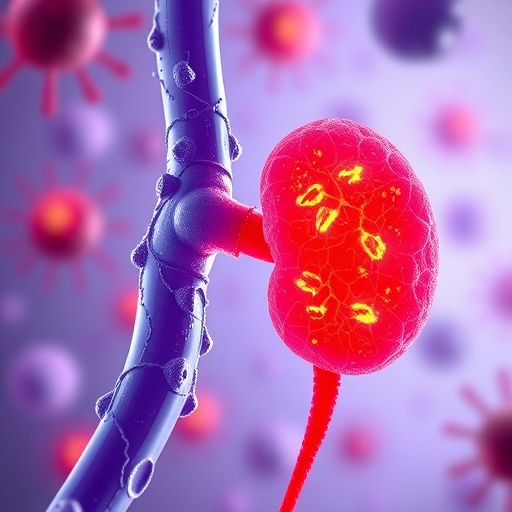In a groundbreaking revelation poised to redefine therapeutic strategies for advanced renal cell carcinoma (RCC), researchers at Dana-Farber Cancer Institute have elucidated a novel mechanism driving resistance to immune checkpoint inhibitors—a cornerstone of modern cancer immunotherapy. The study delineates the pivotal role of interferon-gamma (IFNγ) signaling within tumor-associated myeloid cells, highlighting how this specific immune crosstalk undermines the efficacy of treatments designed to unleash the body’s own immune defenses against kidney cancer.
Immune checkpoint inhibitors (ICI) have transformed the treatment landscape for advanced RCC, offering hope where conventional therapies have often fallen short. However, the clinical challenge remains stark: a considerable subset of patients exhibit primary resistance to ICIs. The enigmatic nature of this resistance has propelled investigators to delve deeper into the tumor microenvironment’s cellular and molecular dynamics, seeking biomarkers that predict or even counteract therapeutic failure.
Employing advanced single-cell RNA sequencing technologies across multiple independent patient cohorts, the research team meticulously charted the cellular heterogeneity and interferon signaling patterns within RCC tumors. This high-resolution approach allowed them to discern subtle yet consequential differences in how diverse cell types orchestrate immune responses. Their computational modeling quantified the interferon signaling dynamics, particularly spotlighting the nuanced role of IFNγ.
Previously, interferon signaling was broadly presumed to uniformly enhance anti-tumor immunity; however, this study overturns that assumption by demonstrating a dichotomous function contingent on the cellular context. Specifically, IFNγ signaling within myeloid cells—such as macrophages and dendritic cells—infiltrating RCC tumors, paradoxically fosters an immunosuppressive milieu that correlates with diminished response rates to standard ICIs. Conversely, interferon activity in other tumor-associated cells, including lymphocytes, does not exhibit the same resistance association.
This insight underscores a critical paradigm shift: the tumor microenvironment’s myeloid compartment is not merely a passive bystander but an active mediator of immune evasion. By harnessing single-cell transcriptomics and integrating these data with clinical outcomes from multiple trials, the team confirmed that heightened IFNγ-driven myeloid signaling serves as a predictive biomarker for immunotherapy resistance in RCC patients.
Beyond biomarker discovery, these findings open a promising therapeutic avenue. Targeting the interferon-gamma signaling axis within myeloid cells may sensitize resistant tumors to existing ICIs. Such interventions could recalibrate the immune milieu, transforming cold or unresponsive tumors into those amenable to immune attack. This strategy offers a nuanced alternative to broad immunosuppression, aiming instead for precise modulation of the tumor-immune interface.
The implications extend further because traditional biomarkers used in other cancers to forecast ICI responsiveness, such as PD-L1 expression, have proven ineffective in RCC. This study’s integrative computational and molecular approach provides an innovative framework for tailored diagnostics and treatment optimization, potentially improving clinical outcomes by personalizing immunotherapy regimens.
Clinically, the identification of IFNγ-driven myeloid cell signaling as a resistance mechanism challenges oncologists to rethink therapeutic sequences. Patients may benefit from early intervention with combinatory regimens that target myeloid cell pathways alongside immune checkpoints, thereby preempting or overcoming resistance. This multitarget approach could maximize response durability and reduce progression rates.
Moreover, the research underscores the intricate balance of immune regulation in cancer. While interferon-gamma classically promotes anti-tumor immunity by enhancing antigen presentation and T cell activation, within the myeloid lineage it paradoxically orchestrates suppressive networks that blunt these effects. Dissecting these cellular dialogues aids in understanding how tumors exploit immune signaling to their advantage, revealing vulnerabilities previously obscured.
Future directions inspired by this study include the development of pharmacologic agents or biologics that specifically inhibit IFNγ signaling within myeloid populations, accompanied by diagnostic assays to stratify patients accordingly. Additionally, exploring how these pathways interact with other immunoregulatory circuits may enhance combinational therapy design, mitigating compensatory resistance mechanisms.
This research epitomizes the transformative power of single-cell analytics combined with systemic clinical data integration. It enriches our molecular understanding of RCC immunobiology, setting a new benchmark for investigating and overcoming immunotherapy resistance in solid tumors.
As the oncology community wrestles with the complexities of immune resistance, these insights from Dana-Farber lend hope for more effective, individualized cancer treatment paradigms. They encourage a shift toward interventions that not only activate immune effectors but also dismantle the suppressive undercurrents orchestrated by tumor-associated myeloid cells.
Such advancements are pivotal steps toward realizing the full potential of cancer immunotherapy—transcending current limitations and moving closer to durable, widespread remissions for patients confronting advanced kidney cancer.
Subject of Research: Myeloid cells mediate interferon-driven resistance to immunotherapy in advanced renal cell carcinoma
Article Title: Myeloid cells mediate interferon-driven resistance to immunotherapy in advanced renal cell carcinoma
News Publication Date: October 31, 2025
Web References:
https://www.cell.com/immunity/fulltext/S1074-7613(25)00468-6
http://dx.doi.org/10.1016/j.immuni.2025.10.013
Image Credits: Dana-Farber Cancer Institute
Keywords: Kidney cancer, Myeloid cells, Interferon-gamma, Immune checkpoint inhibitors, Renal cell carcinoma, Immunotherapy resistance, Tumor microenvironment, Single-cell RNA sequencing, Biomarkers, Immuno-oncology
Tags: advanced renal cell carcinoma treatment strategiesbiomarkers for immunotherapy responsecellular heterogeneity in kidney tumorscomputational modeling of immune responsesimmune checkpoint inhibitors in renal cell carcinomaimmune crosstalk in cancer therapyimmunotherapy resistance mechanismsinterferon-gamma signaling and tumor microenvironmentmyeloid cell signaling in kidney cancerresistance to cancer immunotherapysingle-cell RNA sequencing in cancer researchtumor-associated myeloid cells in RCC





